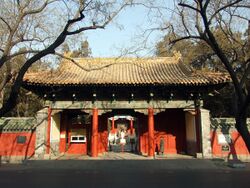Social:Jinshi (imperial examination)
The jinshi degree was first created after the institutionalization of the civil service exam. Initially it had been "for six categories" but was later consolidated into a single degree. Throughout the Tang Dynasty, every year around 1-2 percent of test takers would obtain a jinshi title out of a total of 1-2 thousand test takers.[1]
The numbers of jinshi degrees given out were increased in the Song Dynasty, and the examinations were given every three years. Most senior officials of the Song Dynasty were jinshi holders.[2]
The Ming dynasty resumed the civl-service exam after its occurrence became more irregular in the Yuan dynasty. After the reign of the Emperor Yingzong of Ming, it became the rule that only jinshi holders could enter the Hanlin Academy. On average around 89 jinshi per year were conferred.[3]
During the Qing dynasty around 102 jinshi degrees were given a year.
The highest scoring jinshi in the country was known as the zhuangyuan, a term that survives today as a high scoring gaokao test taker or just someone who is very good as a skill.
Subtypes of jinshi recipients
- Jinshi Jidi (進士及第, lit. "distinguished jinshi"), graduates ranked first class in the court exam, usually only the top three individuals were qualified for this title.
- Zhuangyuan (狀元, lit. "top thesis author"), the jinshi who ranked first overall nationwide.
- Bangyan (榜眼, lit. "eyes positioned alongside"), the jinshi who ranked second overall just below zhuangyuan.
- Tanhua (探花, lit. "flower snatcher"), the jinshi ranked third overall.
- Jinshi Chushen (進士出身, lit. "jinshi background"), the graduates who ranked second class in court exam, ranking immediately after the tanhua.
- Tong Jinshi Chushen (同進士出身, lit. "along with jinshi background"), graduates ranked third class in the court exam.
Notable jinshi recipients by year
Tang Dynasty
- Chen Zi'ang (c. 685)
- Wang Changling (7??)
- Meng Jiao (7??)
- Lu Lun (7??)
- Yan Zhenqing (734)
- Cen Shen (744)
- Liu Changqing (750s)
- Yuan Jie (754)
- Han Hong (poet) (754)
- Ouyang Zhan (792)
- Liu Yuxi (793)
- Li Ao (philosopher) (798)
- Cao Que (803)
- Li Guyan (812)
- Ma Zhi (819)
- Xiahou Zi (826)
- Xiao Fang (827)
- Du Mu (828)
- Xiao Qing (8??)
- Wei Cong (8??)
- Yu Cong (8??)
- Song Shenxi (8??)
- Lu Guangqi (8??)
- Sun Wo (8??)
- Pei Zhi (8??)
- Wang Pu (Tang dynasty) (8??)
- Pei Tan (9th-century Tang chancellor) (8??)
- Wei Fu (830)
- Du Shenquan (833-873)
- Cui Yanzhao (849)
- Yu Wuling (85?)
- Wang Hui (Tang dynasty) (858)
- Xiao Gou (864)
- Pi Rixiu (867)
- Pei Shu (871)
- Yang She (875)
- Ni Shu (877)
- Xue Yiju (87?)
- Zhao Guangyin (891)
- Shen Song (895)
- Wang Dingbao (900)
- Ma Yinsun (9??)
- Cui Xie (???)
- Liu Kai (Song dynasty) (973)
Song Dynasty
- Song Di (Fugu) (10??)
- Bao Zheng (1028)
- Cai Xiang (1030)
- Ouyang Xiu (1030)
- Chen Yuyi (1113)
- Qin Hui (1115)
- Yang Wanli (1154)
- Lu Zhi (poet) (1269)
Yuan dynasty
- Liu Bowen (c.1350)
Ming dynasty
- Yu Qian (1421)
- Han Yong (Ming dynasty) (1422)
- Yang Tinghe (1478)
- Xu Pu (1454)
- Lu Rong (1466)
- Wang Yangming (1499)
- Yan Song (1505)
- Zhu Wan (1521)
- Xu Jie (Ming dynasty) (1523)
- Luo Hongxian (1529)
- Zhao Wenhua (1529)
- Qian Dehong (1532)
- Fan Qin (1532)
- Gao Gong (1541)
- Liang Youyu (1550)
- Xu Zhongxing (1550)
- Gui Youguang, (1565) nine attempts[4]
- Li Shida (1574)
- Li Sancai (1574)
- Zang Maoxun (1580)
- Ye Xianggao (1583)
- Zhu Guozhen (Ming dynasty) (1589)
- Ruan Dacheng (1616)
- Ni Yuanlu (1621)
- Shi Kefa (1628)
- Sun Chuanting (1619)
- Liu Tong (1634)
- Zhou Lianggong (1640)
- Zhao Yingcheng (1646)
- Han Weiji (1664)
Qing dynasty
- Jiang Tingxi (16??)
- Wei Yijie (1646)
- Guwen Guanzhi (1658)
- Li Guangdi (1670)
- Nian Gengyao (1700)
- Zhang Tingyu (1700)
- Akdun (1709)
- Zhang Zhao (Qing dynasty) (1709)
- Liu Tongxun (1724)
- Yuan Mei (1739)
- Ji Yun (1754)
- Sun Shiyi (1761)
- Yao Nai (1763)
- Sun Yuting (1775)
- Ruan Yuan (1789)
- Gao E (writer) (1795)
- Lu Kun (1799)
- Bao Shichen (1808)
- Cheng Enze (1811)
- Lin Zexu (1811)
- Ge Yunfei (1823)
- Huang Juezi (1823)
- Luo Bingzhang (1832)
- Luo Zundian (1835)
- Zeng Guofan (1838)
- Feng Guifen (1840)
- Jiang Zhongyuan (1844)
- Wenxiang (1845)
- Xue Fucheng (1845)
- Ma Xinyi (1847)
- Li Hongzhang (1847)
- Tan Zhonglin (1856)
- Lao Chongguang (18??)
- Liu Bingzhang (1860)
- Cuigiya Lianyuan (1868)
- Xu Jingcheng (1868)
- Qu Hongji (1871)
- Zuo Zongtang (1875), granted an "honorary jinshi" by the Guangxu Emperor for his military achievements
- Shen Jiaben (1883)
- Liang Qichao (1890)
- Huang Xing (1893)
- Wu Leichuan (1898)
- Theodone C. Hu (1906)
People who failed jinshi exams
- Wu Cheng (philosopher)[5]
- Li Zhen (Later Liang)
- Li Yu (Later Tang)
- Feng Yu
See also
- Qing literati
- Shujishi
References
- ↑ Fu, Zhengyuan. Autocratic Tradition and Chinese Politics. p. 98.
- ↑ History of Song
- ↑ Ho 1962
- ↑ Wang Xijun (王錫爵; 1534–1611). Taipusi sicheng Guigong muzhiming (太僕寺丞歸公墓誌銘) [Gui Youguang's Epitaph]
- ↑ Gedalecia, David. The Philosophy of Wu Ch’eng: A Neo-Confucian of the Yüan Dynasty. Bloomington: Indiana University, 1999.


